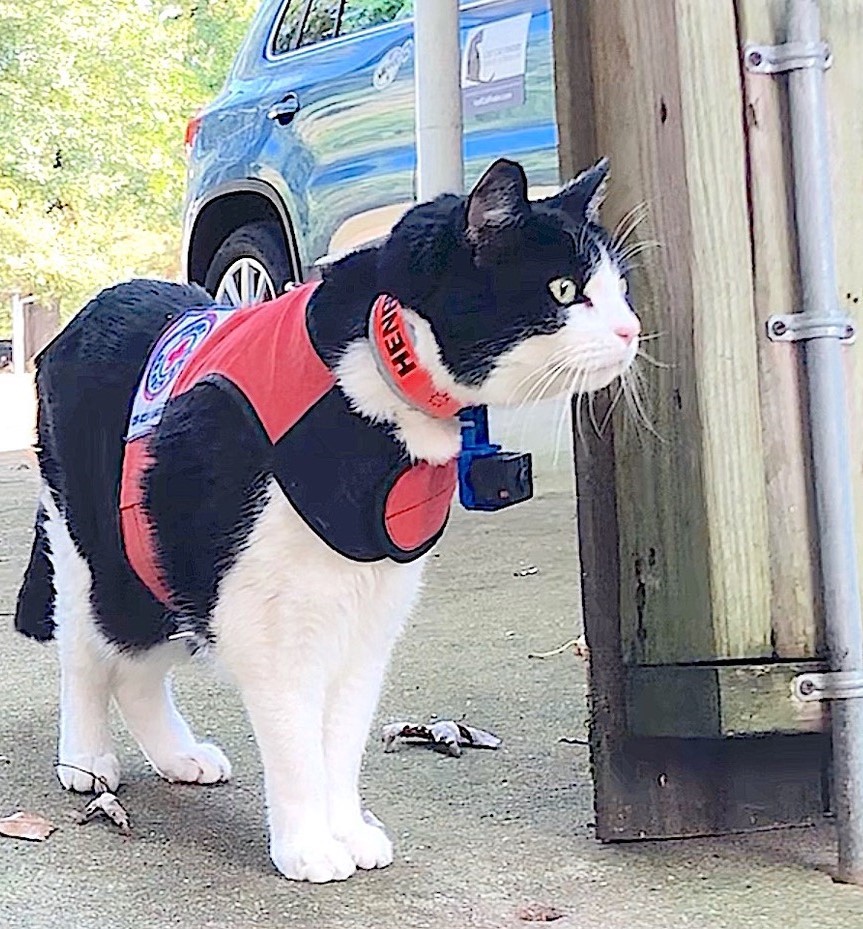Move over, Sherlock Holmes. Take a seat, Ace Ventura. When it comes to finding lost cats, most detectives are, well, clueless. But not Kim Freeman.
As founder of Lost Cat Finder, Freeman is recognized as the world’s first full-time cat detective. She teams up with her purring partner, Henry, to find missing cats all over the U.S. as well as in 17 countries.
People who adore their indoor cats know that one of the worst events to ever happen is when a door is left ajar and their curious cat slips out and goes missing. Or you come home from a long day of work only to find the window screen has been punched out and your indoor cat has escaped.
Freeman tracks down missing cats herself and never relies on a search-and-rescue dog to aid her.
“Most cats don’t want to be found by a dog, even a search-and-rescue dog,” says Freeman, who lives in the Atlanta area.
Instead, her four-legged sleuth with a talent for sniffing out lost cats is a tuxedo cat named Henry, adopted from an animal shelter. He has helped her locate 10 missing cats so far.
“Henry is trained to follow the scent of cats who escape homes,” she says. “He has found a cat who jumped out of a car at a gas station.”
The leash-trained Henry sports a lighted cat collar with a small camera so Freeman can keep up with his search in the dark and see what he sees.
Here is a link to a short video that spotlights Henry in action in finding a lost cat.
Freeman says each case presents its own special challenges, but like any good detective, she uses all her senses and available tools to gather clues to track down the missing cat.
“I do a 15-page profile on each cat,” she says. “I factor in the cat’s personality as well as study the geography using Google maps. The more information I have, the better I can help people find their cats.”
Freeman debunks some common approaches to finding a lost cat:
- Trying to lure your cat back home by putting his litter box on the front porch is a strategy that can backfire. “This action will attract wildlife and predators as well as territorial bully cats who may chase your cat farther away,” she says.
- Resist walking around, calling for your cat by name and shaking a container of treats. “If you call and shake the treats, your cat may move toward your voice, but not come out of hiding and may end up farther from your home.”
- Do not chase your cat. “You can’t catch a cat – they are too fast and even a three-legged cat can outrun you,” she says. “Chasing them will make them feel like prey and they will run further and faster. Instead, sit down and open a can of tuna to get your cat to come to you. Be at a familiar place like your door.”
One strategy that works: Look near your home. “Dogs roam; cats hide,” she says. “People tend to look all over town for their cat, but they really need to comb areas near their home.”
She recommends searching during the day and luring at night, using a smelly food favorite. Some cats like fish while others are fans of chicken. Know what your cat prefers.
If safe to do so, leave the door where the cat scooted out anchored open to give him the ability to enter the same way that he left.
Her parting advice? “It often takes a combination of time, diligence, and dedication to find a lost cat. Searching for a lost cat is hard work and emotionally stressful for both you and the kitty. Your cat is counting on you to find him. Count on me and my guidance to do it.”
Freeman has written a coursebook, How to Find Your Lost Cat: Advice from a Cat Detective. Here’s a brief excerpt:
“Before you go searching the neighborhood, take a deep breath. Stand at the escape door. Imagine you are 10 inches tall and deaf. Now, from your cat’s perspective, where is the closest place that offers quiet and cover? Which direction offers more shade and concealment? Which yards are not already claimed by other cats or dogs? Now think back to anything that happened just before your cat’s disappearance. Has anything around the house changed? Were there visitors? Delivery or service vehicles? Loud noises? Not all missing cats are lost. Some are upset by a new pet, guest or baby, and intentionally leave to find somewhere more peaceful.”
This article was reviewed/edited by board-certified veterinary behaviorist Dr. Kenneth Martin and/or veterinary technician specialist in behavior Debbie Martin, LVT.
Arden Moore is The Pet Health and Safety Coach. She is a best-selling author, radio show host, in-demand speaker and master certified pet first aid/CPR instructor who travels the country teaching with Pet Safety Dog Kona and Pet Safety Cat Casey. Learn more at www.ardenmoore.com and www.facebook.com/ardenmoore.








